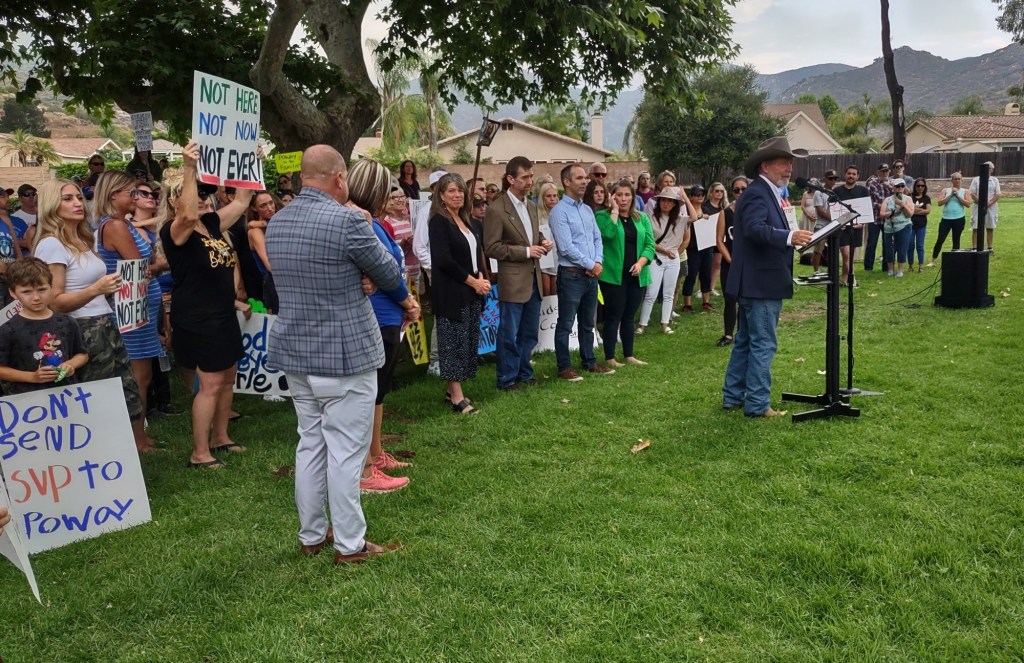
A new state audit of a program that monitors the release of sexually violent predators after treatment suggests looking into the feasibility of creating group homes, a sort of waystation while they wait for the state to find them a longer-term place to live in the community.
But the review from the California State Auditor, released last week, is silent on the biggest concern many communities have raised: Where should that long-term place be?
RELATED: Public opposition thwarts success of California’s sexual predator placement program, state audit says
Finding housing has been a notoriously difficult task. In San Diego and across the state, communities swiftly and loudly rail against placing a sexually violent predator in their neighborhoods. Potential landlords willing to rent a home have faced backlash throughout the state, the audit notes, including one whose proposed rental home was heavily damaged by vandals.
That all means program participants are often placed in rural backcountry sites such as Jacumba and Borrego Springs, away from populated city centers. Officials are currently looking for a place to house three others in San Diego County — some of whom could be considered for release as transients if no suitable housing is found.
Sexually violent predators, or SVPs, have been convicted of a violent sex crime and diagnosed with a mental condition that makes them likely to re-offend. It’s a relatively small group — less than 1% of the state’s sexual offender population — and they are court-ordered to live in a state hospital after they serve their prison sentence. At the hospital, they can choose to take part in a treatment program that could lead to eventual conditional release in the community under tight restrictions.
That final release phase is what the audit looked at — how the Department of State Hospitals manages the conditional release of sexually violent offenders, and how contractor Liberty Healthcare handles placement, treatment and monitoring of the offenders.
State Sen. Brian Jones, the Republican and senate minority leader — who represents a wide swath of the eastern portion of the county from Campo to Pala Mesa — was the one who pressed for the audit.
“SVPs have committed such heinous and violent sex crimes, I firmly believe they should never be released from prison or state hospitals,” Jones said in a statement provided Friday. “However, when a court mandates their release, we have a duty to ensure the safety of our communities.”
He said that if conditional release is required “it must occur on state property under strict and constant supervision, as past governors have enforced. These dangerous individuals should never be placed in our neighborhoods under any circumstance.”
Auditors found that it takes an average of 17 months to find a suitable home, and in San Diego County specifically, it’s an average of 19 months. They suggested that instead of making program participants wait at the hospital while Liberty finds housing, the participants could move into “state-managed transitional facilities.” They note that other states and other California programs use such group homes as a way to allow program participants to more quickly move into outpatient treatment and adjust to living in a less restrictive environment.
State Hospitals’ officials rejected the idea and said using transitional housing could ultimately delay final placement. Among the challenges, they said, would be finding locations for the group homes, which they said would be harder than finding individual placements.
They also said putting people in transitional housing would add extra cost and would not solve the ultimate problem of still needing to find places for SVPs to live in the community.
San Diego County Public Defender Paul Rodriguez, whose office represents people in the program, said his office “resoundingly support(s)” transitional housing, and he noted that some of their clients have waited more than two years for a placement.
“Transitional housing, as suggested by the audit, would allow our clients to begin the supervised community reiteration phase of their treatment more efficiently,” he said, adding that it would also allow clients to “begin their adjustment to living in a less restrictive environment more quickly.”
The law changed in January 2023 to require newly created committees in each county to advise on housing options. But, the audit found, the housing committees “have not yet proven to be an effective component” and instead may have contributed to delays.
The audit acknowledges the difficulty in finding long-term housing, but does not offer specific solutions; that was not an area auditors were asked to look at, and that is something the new housing committees are supposed to better address. However, community placement is the part of the program that draws the most attention, with scores of people taking to the media or to the streets to fight having an SVP in their neighborhood
According to the audit, the state has spent $93 million to house and monitor the 56 program participants who have been allowed to live in the community — an average of $1.66 million per participant.
It also found that only two of the 56 participants reoffended — one for possessing child pornography, and the other for a sex offender reporting violation — after their release. By contrast, of the 125 sexually violent predators who were not part of the program but had been released into the community statewide, 24 were convicted of subsequent crimes, including seven whose offenses were of a sexual nature.

















































